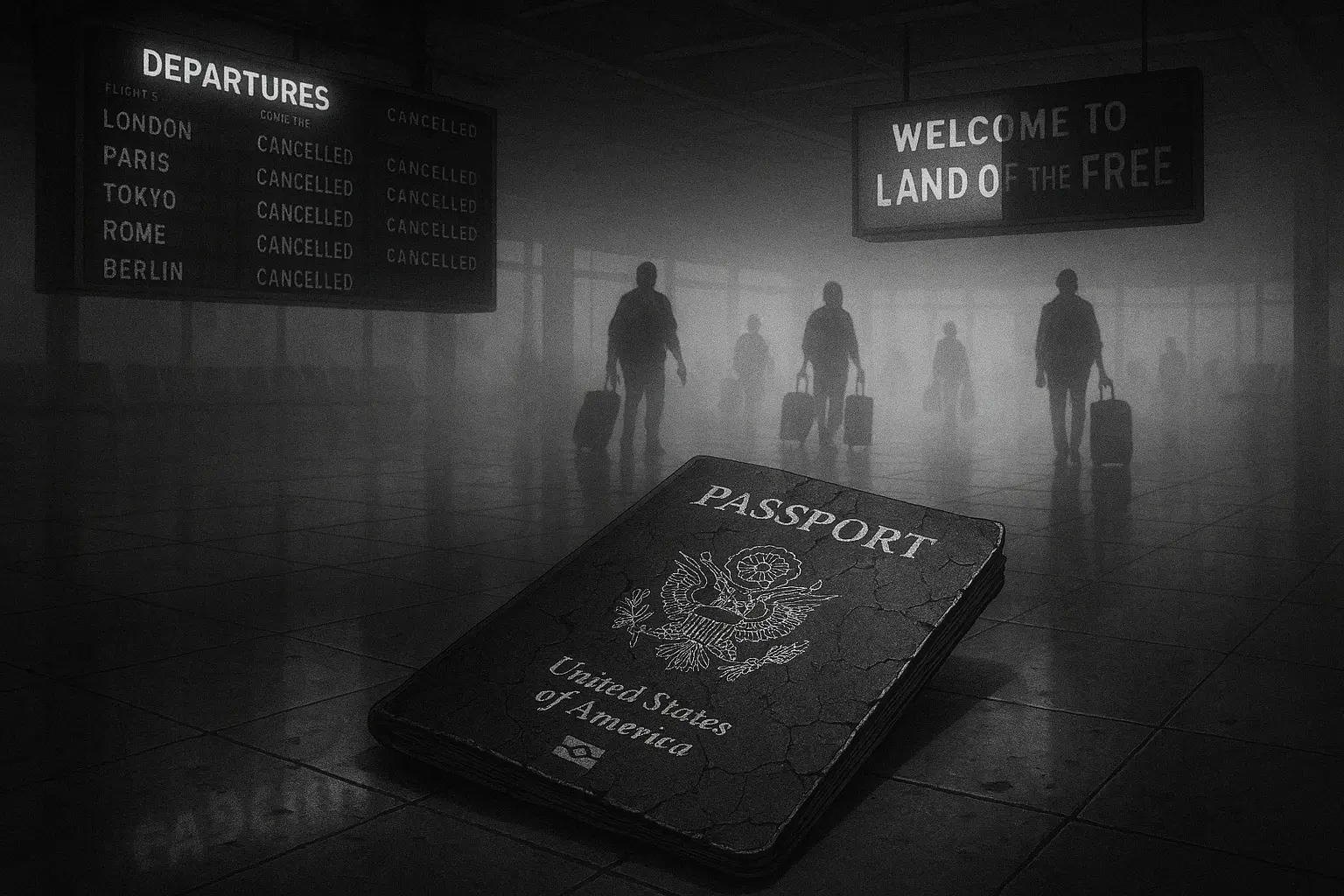SignalGate and the Quiet Collapse of Trust: How a Group Chat Shook the U.S. Intelligence Order
Why This Article Exists
There comes a point when staying quiet becomes a form of complicity.
I’ve written about infrastructure, systems, and the hidden architecture of our lives—from buildings and energy to digital frameworks. But politics, power, and security are infrastructure too. They form the scaffolding that holds nations together. And when that scaffolding begins to rot from the inside, it becomes not only relevant—but necessary—to talk about it.
SignalGate is not just a scandal. It’s not just another “leak” or headline in a chaotic news cycle. It’s a moment of rupture. A moment when many of us—regardless of where we live—need to consider whether the institutions we rely on, or ally ourselves with, are still structurally sound.
Everything is connected. Energy policy ties into geopolitics. Digital systems affect national security. And the credibility of a superpower’s leadership has a ripple effect far beyond its borders.
This is why I’m writing this article. Because there’s no “safe distance” from institutional collapse anymore.
What Actually Happened?
On March 15, 2025, Jeff Goldberg—editor-in-chief of The Atlantic—received a series of unexpected notifications. He had been added to a Signal group chat titled “Houthi PC small group.” The names in the chat were not anonymous operatives or random contacts. They included the U.S. Secretary of Defense Pete Hegseth, National Security Advisor Mike Waltz, Vice President J.D. Vance, Secretary of State Marco Rubio, and the Director of National Intelligence, Tulsi Gabbard.
This wasn’t an internal strategy session or a media briefing gone awry. It was, according to Goldberg’s later reporting, a live operational planning room. The cabinet-level officials were openly discussing the timing, targets, weapons systems, and expected outcomes of a U.S. military strike against Houthi rebels in Yemen. The Pentagon was involved. CENTCOM was in motion. And Goldberg—by all appearances accidentally added by Waltz—was watching from his phone, in a supermarket parking lot.
Within hours, the predicted attacks began. Explosions rocked the Yemeni capital of Sanaa just minutes after the group chat had discussed their intended time window. Goldberg, stunned by the accuracy and gravity of what he had just witnessed, remained silent for days before informing the administration and eventually publishing his account.
The White House, through National Security Council spokesperson Brian Hughes, confirmed the authenticity of the chat and admitted an “inadvertent” addition to the thread. Trump himself denied any knowledge of the planning, claiming during a press appearance, “You’re telling me about it for the first time.”
The incident has since been dubbed SignalGate, and while it may read like a tech-era farce, its implications are profoundly real.
Why This Matters
This wasn’t just a blunder. It was a fundamental breach of operational protocol, national trust, and international credibility.
When high-level military planning is conducted in unsecured environments, it doesn’t just risk a failed mission—it risks lives, alliances, and long-term geopolitical stability. In most democratic states, this level of recklessness would be met with resignations, inquiries, and restructured oversight. In 2025’s United States, it has instead been met with deflection, minimization, and, perhaps most worryingly, amnesia.
That’s not metaphorical. Tulsi Gabbard, the Director of National Intelligence and one of the most powerful intelligence figures in the country, told a Senate committee under oath that she could not recall her participation in the chat. This wasn’t just a momentary lapse; it was a deliberate disassociation from one of the most dangerous breaches in modern U.S. intelligence history.
This event is important not only because it happened—but because of what didn’t happen next. No immediate firings. No public accountability. No reassertion of institutional norms. Instead, a kind of collective shrug from the administration. A “what are you gonna do?” energy that sends a clear signal: if you’re inside the circle, you’re untouchable.
That is the real scandal.
It undermines the legitimacy of every future military action. It weakens the credibility of the very offices tasked with protecting intelligence. And it tells every adversary—state or non-state—that the United States is no longer operating with a secure chain of command.
And if the U.S. can’t be trusted to guard its own war plans, how can its allies be expected to share theirs?
The Global Fallout
In the days that followed SignalGate, the international reaction was noticeably muted. Not because it wasn’t serious—but because it was.
Allies within NATO, the EU, and the Five Eyes intelligence alliance quietly began conducting internal reviews. Could their shared information have ended up in unsecured threads? Had their own military or strategic briefings passed through the hands of officials now implicated in the chat? Was their trust in the U.S. still justified?
One doesn’t need a public scandal to understand the diplomatic calculus. Intelligence agencies from London to Canberra, Stockholm to Ottawa, began to reevaluate protocols. The Five Eyes relationship, one of the most elite intelligence-sharing agreements in the world, depends entirely on mutual trust, compartmentalization, and operational discretion. SignalGate undermined all three.
Several European analysts have already gone on record suggesting a temporary pause in the most sensitive exchanges with Washington. While that may not sound dramatic to the average citizen, it’s the geopolitical equivalent of pulling the emergency brake. And like any sudden stop, the momentum loss will be felt for months, possibly years.
But it’s not just formal channels that are affected. Informal networks—backchannel discussions, shared crisis playbooks, economic coordination during global instability—are all under strain. A foreign minister can pick up the phone to Washington, but if the underlying confidence in secrecy and control is gone, the trust doesn’t follow.
That’s the true ripple effect of SignalGate. And it’s still expanding.
What SignalGate Reveals About Power
SignalGate is not just a story about technology or espionage—it’s a story about power.
The leak didn’t happen in a vacuum. It happened in a political environment where normal processes have been stripped away and replaced with something else: improvisation, loyalty, media spin, and distrust of institutions. This isn’t dysfunction at the margins—it’s dysfunction at the center.
The officials involved didn’t use Signal because it was officially approved. They used it because it was unofficial. Disappearing messages, no archiving, no transparency. The very appeal of the platform was that it allowed them to operate outside the system—without checks, without oversight, without consequences.
That’s not just a security flaw. It’s a governing philosophy.
And that governing philosophy has taken root at the highest levels of power. SignalGate reveals a shift away from institutional process and toward personal networks of trust and loyalty. In that world, if you’re in the chat, you’re in the circle. If you’re not, you’re irrelevant. If you leak, you’re the enemy. If you lie, you’re protected.
In that world, national security becomes just another performance.
What used to be handled by vetted procedures and professional coordination is now shaped by messaging, optics, and the right emoji at the right time.
That is what makes SignalGate dangerous. Not just the breach itself—but the normalization of the environment that allowed it to happen.
What Comes Next?
In a functioning democracy, SignalGate would have triggered a wave of corrective action—internal reviews, independent investigations, resignations, and a public commitment to restoring institutional boundaries. Instead, we’ve seen little beyond silence and spin.
It’s too early to know the full consequences. Intelligence sharing with the U.S. may be reduced quietly, without formal statements. Whistleblowers may emerge—if they dare. Allies may begin exploring alternative security alignments. Inside the U.S., the story may be buried under the weight of the next scandal or outrage cycle.
But some damage is already done.
A precedent has been set that war planning can be discussed in Signal threads. That accidental leaks to journalists don’t result in consequences. That intelligence chiefs can claim amnesia and keep their jobs. That institutions designed to protect a nation can instead be used to shield a few.
The U.S. government now faces a simple but stark choice: confront the rot, or continue building power atop it. One restores trust. The other deepens the crisis.
For Further Viewing
Portions of Senate questioning and press responses regarding SignalGate—including testimony from Director Gabbard—can be found through official U.S. government channels and public archives. Viewers are encouraged to watch raw footage on platforms like YouTube to form their own impressions.
SignalGate may one day be remembered as a footnote—or as a hinge point. It depends on what comes next. But if this incident fades without reckoning, we may all be forced to confront what happens when the backchannel becomes the command center—and when trust collapses in plain sight.
Sources & Further Reading
- The Atlantic: Jeff Goldberg, “What I Saw in the Group Chat” (March 2025)
- Talking Points Memo: “SignalGate Is Bad. But OPSEC Isn’t Even the Worst Part of It” (March 2025)
- Daily Caller: “White House Confirms Hegseth, Waltz & Co. Accidentally Leaked War Planning To Journalist” (March 2025)
- New Republic: “Tulsi Gabbard Claims Amnesia About War Plans Group Chat” (March 2025)
- MSN News: “Tulsi Gabbard Suddenly Claims Amnesia” (March 2025)
- Cornucopia? by Lars Wilderäng: “Drittsirkuset – Allvarliga konsekvenser av Vita Husets slarv med informationssäkerhet” (March 2025)
- Politico, CBS News, Sky News: Various reporting on aircraft carrier and B-2 deployments (March 2025)
- U.S. National Archives guidelines on SCIF protocols and classified communications
- Senate Intelligence Committee Hearings, March 2025 (available via C-SPAN and YouTube)
- DoD and NSA documentation on secure communications (declassified publications)
- Trump press briefing with Louisiana officials, March 24, 2025 (PBS)






Post Comment